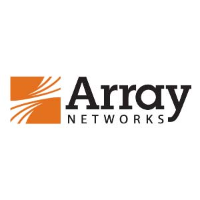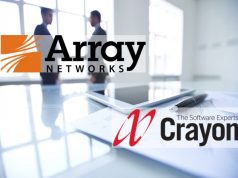Array Networks Inc., a global leader in application delivery networking, today announced the immediate availability of its new APV 2600, 5600, 10600 and 10650 application delivery controller appliances. Aimed at delivering superior price-performance and value for key segments of the ADC market, each new appliance supports 10 Gigabit Ethernet interfaces and the latest in multi-core processing and multi-core SSL acceleration, and delivers more performance at lower prices as compared to brand name ADCs.
APV2600 – Ideal for small to medium-sized enterprises, the APV2600 is a compact 1U appliance that supports 10 Gbps of throughput, 5000 2048-bit SSL transactions per second and 3 Gbps of SSL throughput. As compared to brand name ADCs aimed at SMEs, the APV2600 delivers twice the performance and is significantly less expensive.
APV5600 – Designed for enterprises with larger traffic demands, the APV5600 is a 2U appliance that supports 15 Gbps of throughput, 25,000 2048-bit SSL transactions per second and 10Gbps of SSL throughput. As compared to brand name ADCs aimed at larger enterprises, the APV5600 delivers 50% more performance and handles three times more SSL transactions per second at a much lower price per transaction.
APV10600 – Engineered for the needs of large and global enterprises and service providers, the APV10600 is a 2U appliance that supports 80 Gbps of throughput, 45,000 2048-bit SSL transactions per second and 15 Gbps of SSL throughput. As compared to brand name ADCs aimed at high-end deployments and organizations, the APV10600 delivers twice the performance and is significantly less expensive.
APV10650 – Array’s top-of-the-line flagship application delivery controller, the APV10650 is the highest performing ADC appliance on the market, supporting 120 Gbps of throughput, 70,000 2048-bit SSL transactions per second and 25 Gbps of SSL throughput.
For each new appliance, particular emphasis has been placed on unmatched price-performance for 2048-bit SSL acceleration. SSL acceleration is the most commonly purchased ‘advanced’ feature for customers buying a load balancer or application delivery controller – driven by the need to secure applications, content and transactions over the Internet. In addition, 2048-bit SSL encryption is five times more computationally intense as compared to the older 1024-bit standard. With new Array APV Series appliances, enterprises gain a cost-effective means to support growing demand for SSL while meeting governing body and certificate authority mandates for higher security standards.
Advanced ADC Features
In addition to advanced server load balancing, link load balancing, global server load balancing (GSLB), connection multiplexing, SSL acceleration, compression, caching, traffic shaping and application security, APV2600, 5600, 10600 and 10650 appliances support a range of next-generation features at no extra cost including:
ePolicy™Scripting: Allows administrators to create custom logic to control application traffic
IPv6: IPv6 Ready Forum Gold Certified to support feature parity and operate in IPv6 networks
SLB-PT and NAT64/DNS64: Supports migration from IPv4 to IPv6 and provides a means for IPv6 and IPv4 networks and clients to communicate
Independent Session Control: Improves persistence and security while enhancing application performance
eCloud™ API: Gives cloud providers a scripting tool to assist with integrating APV Series ADCs with cloud management systems
Additional advanced ADC features including TCP stateful failover, N+1 clustering, role-based administration control and advanced ACLs (SLB QoS)
“The need for cost-effective, high-performance application delivery has become increasingly important as traffic continues to increase and ADCs are tasked with challenges such as enterprise applications, 2048-bit SSL, IPv4/IPv6 coexistence, mobile traffic and cloud services,” said Michael Zhao, President and CEO of Array Networks. “With our new APV appliances, our goal is to provide the features and performance necessary to meet these challenges, while lowering the cost of this essential networking function for enterprise, public sector and service provider organizations” added Michael Zhao.





